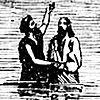- David Marks (preacher)
-
 David Marks
David Marks
David Marks (1805-1845), born in Shandaken, Ulster County, N. Y., on Nov., 4, 1805. At age 13, he set out on foot for Providence, R. I. He walked 368 miles before arriving at Brown University. However, upon his arrival he was informed that tuition would be free, but no other funds were available for boarding or clothing. He then walked 368 miles back home.
On June 11, 1819, he was baptized and became a member of the Freewill Baptist Church in Phelps. The following year he joined the Freewill Baptist Church in Junius.
At age 15, he felt the call of God leading him to enter the ministry. He left home and began preaching in what was known as the Holland Purchase. God blessed his ministry and large congregations would gather to hear his preaching. However, during his first 3 months absence from home, his mother died and his father's house was burned.
See also
References
- David, Marks (1846). Memoirs of the Life of David Marks, Minister of the Gospel. Free-will Baptist printing establishment.
External links
- [1] - David Marks' Biography
- [2] - David Marks' Final Sermon, Thursday, November 13, 1845
- [3] - David Marks' Autobiography
Part of a series on Baptists  BackgroundKey figuresJohn Smyth
BackgroundKey figuresJohn Smyth
Thomas Helwys
Roger Williams
John Bunyan
Shubal Stearns
Andrew Fuller
Charles Spurgeon
D. N. Jackson
William Bullein Johnson Baptist portalCategories:
Baptist portalCategories:- 1805 births
- 1845 deaths
- People from New York
- Baptists from the United States
- Free Will Baptists
- Christian biography stubs
Wikimedia Foundation. 2010.
